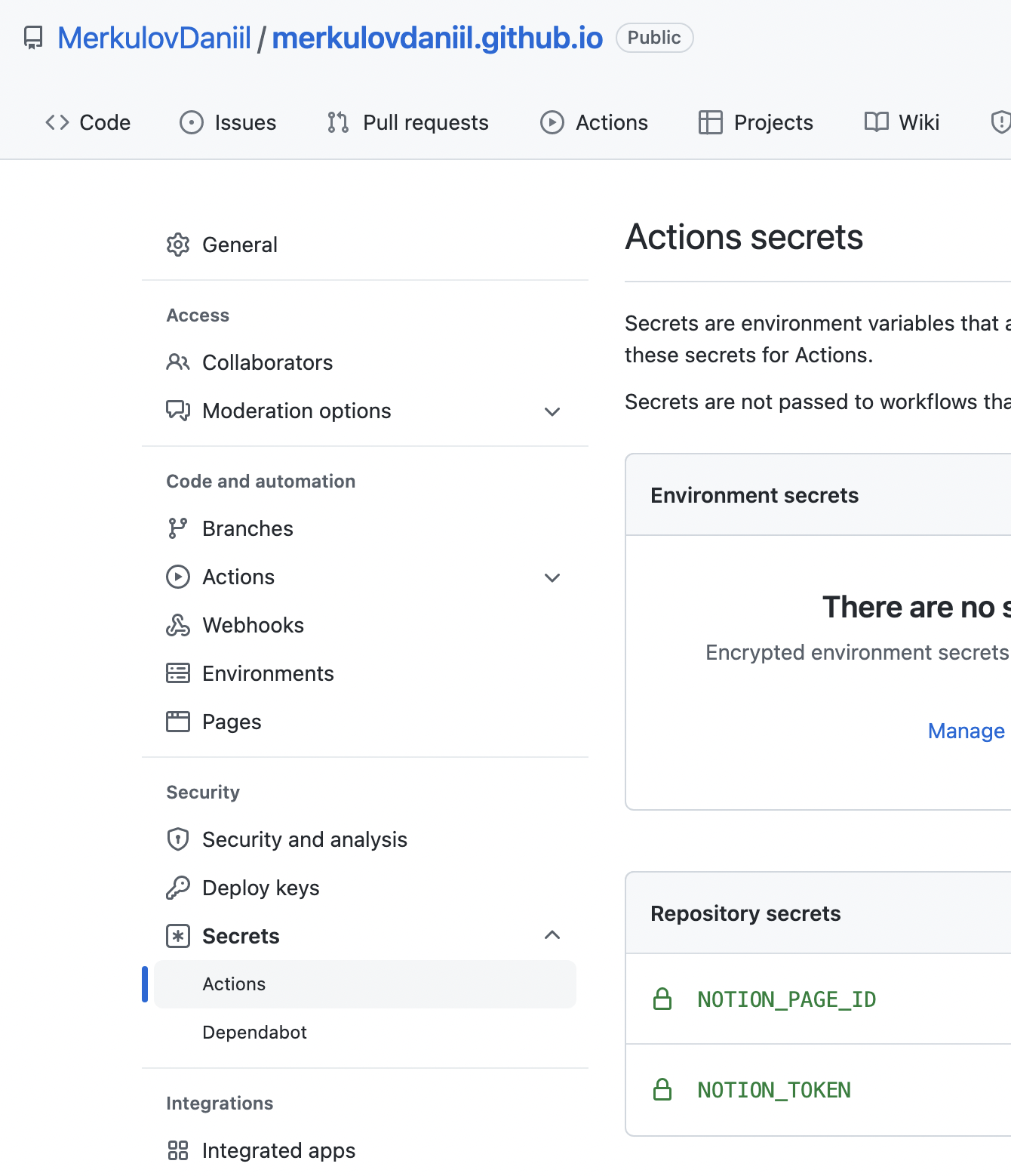NOTION4EVER
Notion4ever is a small python tool that allows you to free your content and export it as a collection of markdown and HTML files via the official Notion API.
✨ Features
- Export ready to deploy static HTML pages from your Notion.so pages.

- Supports nice urls.
- Downloads all your Notion content, which is accessible via API to a raw JSON file.
- Uses official Notion API (via notion-sdk-py, but you can use curls if you want).
- Supports arbitrary page hierarchy.

-
Supports galleries and lists


Note that Notion API does not provide information about the database view yet. That is why notion4ever will render the database as a list if any database entries do not have a cover. Suppose all entries have covers, then it will be displayed as a gallery.
- Lightweight and responsive.
- Downloads all your images and files locally (you can turn this off if you prefer to store images\files somewhere else).
💻 How to run it locally
Just copy or clone the content of this repository and run.
python -m notion4ever -n NOTION_TOKEN -p NOTION_PAGE_ID -bl True🤖 How to run it automatically with Github actions
I will demonstrate it on the specific example of my site. Notion page -> Github repository
✅ Step 1. Create/choose some page in Notion.
- We will need the page ID. For example, the page with URL
https://fmin.notion.site/Danya-Merkulov-12e3d1659a444678b4e2b6a989a3c625has the following ID:12e3d1659a444678b4e2b6a989a3c625. - Also, we will need to create a Notion API token. Go to Notion.so/my-integrations ->
Create new integration. Type the name of the integration and presssubmit. Now you can see your token, which starts withsecret_***under theInternal Integration Tokenfield. - Do not forget to grant access for your integration to edit your page. Go to
Share -> invite -> {YOUR INTEGRATION NAME}.
✅ Step 2. Set up a repository for your static site.
In my case, it is github.com/MerkulovDaniil/merkulovdaniil.github.io/.
-
You need to specify your Notion settings in a Github action secret. Jump to the
Settings -> Secrets -> Actions -> New repository secretand create two secrets: a. NOTION_PAGE_ID b. NOTION_TOKEN
-
Create and configure the following GitHub action in your repository:
publish.yml
```yaml
name: Deploy from Notion to Pages
# on: [workflow_dispatch]
on:
schedule:
- cron: "0 */12 * * *"
jobs:
download_old-generate-push:
runs-on: ubuntu-latest
steps:
# Download packages
- name: Submodule Update
run: |
wget https://dl.google.com/linux/direct/google-chrome-stable_current_amd64.deb
sudo apt install ./google-chrome-stable_current_amd64.deb
sudo apt-get update
- name: Set up Python
uses: actions/setup-python@v2
with:
python-version: 3.10.0
- name: Download notion4ever
uses: actions/checkout@v2
with:
repository: 'MerkulovDaniil/notion4ever'
- name: Install packages
run: pip install -r requirements.txt
- name: Download current version of the site
uses: actions/checkout@v2
with:
# HERE, YOU NEED TO PLACE YOUR REPOSITORY
repository: 'MerkulovDaniil/merkulovdaniil.github.io'
# TARGET BRANCH
ref: main
# THE FOLDER, WHERE NOTION4EVER EXPORTS YOUR CONTENT BY DEFAULT
path: _site
- name: Run notion4ever
run: python -m notion4ever
env:
# HERE YOU NEED TO PLACE URL OF THE ROOT PAGE. PROBABLY IT IS "https://This script will run every 12 hours, and you can change it. Note that the first run could be slow if your page contains a lot of content, but all the subsequent runs will not download existing files. Congratulations 🤗!
🛠 How it works
- Given your notion token and ID of some page, notion4ever downloads all your content from this page and all nested subpages and saves it in a JSON file,
notion_content.json. - Given your raw Notion data, notion4ever structures the page's content and generates file
notion_structured.jsonwith markdown content of all pages and relations between them. Markdown parsing is done via modification of notion2md library. - Given structured notion content, notion4ever generates site from jinja templates located in
./_templatesdirectory. All styles are located in./_sassdirectory and compiled with libsass-python library. By default, site is located in./_sitedirectory
🌈 Alternatives
🆓 Free
- loconotion - Python tool to turn Notion.so pages into lightweight, customizable static websites.
- NotoCourse - properly configured github actions + structuring for loconotion.
- notablog - blog-oriented static site generator from Notion database.
- popsy.co - turns your Notion docs into a site with custom domain.
💰 Paid
- helpkit.so - turns your Notion docs into a hosted self-service knowledge base.
- float.so - turns your docs in Notion into online course.
- super.so - turns your Notion docs into a site.
- potion.so - turns your Notion docs into a site.
🦄 Examples
| Please, add your sites here if you are using Notion4ever. | ||
|---|---|---|
| My personal page | My personal page | |
| MIPT optimization course | MIPT optimization course |
ToDo
- [ ] Proper documentation.
- [ ] Create pip package.
- [ ] Add parallel files downloading.
- [ ] Add search field.